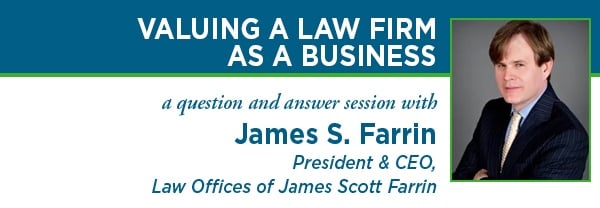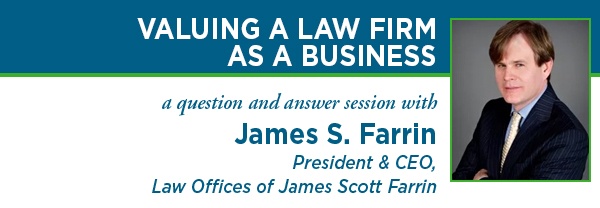Valuing a Law Firm as a Business
By: Kelly Anthony, Esq. | Deputy General Counsel


President and CEO of one of the largest personal injury firms in North Carolina talks about the importance of treating a law firm like a business to achieve long-term success.
James Farrin founded his own firm, the Law Offices of James Scott Farrin, in 1997. While the practice started with only two employees, today the firm has a staff of over 180 and 14 offices throughout the State of North Carolina.
Not only has the firm been able to attain substantial growth since its inception, it was a leader in the case, In re Black Farmers Discrimination Litigation, Case No. 08-md-0511 (the “Black Farmers Case”), which resulted in a $1.25 billion settlement for thousands of black farmers nationwide. Along with civil rights, the firm handles workers’ compensation, auto and trucking accidents, personal injury, social security disability, intellectual property and eminent domain claims.
What prompted you to become a personal injury lawyer?
Out of law school I worked for five years at big law firms in California doing antitrust, insurance coverage and some construction defects litigation, but I did not love it. I then moved back to North Carolina where I had gone to law school and took a job with an acquaintance who was a personal injury lawyer. To my initial surprise, I found personal injury work fulfilling because I was able to make a positive difference for my client’s lives. I found it meaningful.
Why did you want to start your own firm?
I liked the idea of starting a personal injury practice because it required some business sense. My dad was an international businessman and I saw running a personal injury practice as melding law with what I had learned from him. Personal injury, in particular, was a good way to do that because we get paid on a contingency basis, which leads to being results-minded rather than being process-focused. I think by combining business principles with being good lawyers, our firm has been able to achieve great and efficient results.
How did you grow your practice?
Initially we grew by word-of-mouth marketing—doing a good job for our clients and having them tell other people about it. Then, I had one particularly large recovery that allowed us to run TV ads. Once I started a TV campaign in the year 2000, that fast-forwarded everything. We had many more calls and cases, which led to different business and operational issues.
Since then it has been a steady ramp-up. We have advertised more over time and in more markets. Besides TV, the internet has exploded so we use that, we advertise in Spanish, which we did not do originally, and we do direct mail, which we also did not do originally.
Why did you obtain financing from Counsel Financial?
As we were building our practice through TV ads we obtained a line of credit from Counsel Financial to finance our operations. I think that using credit allowed us to expand more quickly. Although we incurred debt obligations, the line of credit for advertising brought in more cases at a rate that led to a return that greatly exceeded the interest charges we were incurring.
Later, when we got involved in the Black Farmers Case, we ended up responsible for financing a large part of the litigation. At first we had a somewhat modest number of farmers involved, but it quickly scaled up and became a multi-million dollar commitment. We had an existing relationship with Counsel Financial and so I approached them about getting financing for that case. Counsel Financial was very helpful—almost like a partner in the process. Not only did we obtain the money we needed from them, but they were great to work with. People like Megan, Paul, Joe and Felice were good about helping me figure out what I needed to do next in terms of financing at various points in the case. The people at Counsel Financial understand the legal landscape, so not only were they able to provide needed financial resources, but along with that, they gave some pretty good advice along the way.
How did you get involved in the Black Farmers Case?
As we built our firm I think we developed a reputation for being a well-run organization. To handle the number of cases that we do in a qualitative manner requires not only good talent, but it also requires good operating systems. So in the year 2007, when the Black Farmers Case was gearing up, a law firm that had been out front signing up clients, but could not handle the large number of clients that were involved in this case, came and approached us to get our assistance.
How were you able to manage such a large litigation and the other areas of your practice?
It was a major challenge. We were a pretty mature entity at the time, so that allowed me and a couple of our top people to focus on the Black Farmers Case, and then we hired people to handle some of the staffing needs for the case. We were also able to backfill our existing practice with other people to keep it running. In addition, it helped that we were able to focus our borrowing needs on the Black Farmers Case and not have to worry about diverting financing to our core operations.
What did you learn from handling the Black Farmers case?
Well, it was immensely satisfying, but extraordinarily difficult. Like many entrepreneurs we were presented with an opportunity and maybe underestimated the degree of difficulty involved. That led to being part of a project that stretched us enormously. However, it was the challenge of a lifetime. We got through it and it turned out to be very, very successful. I think we did a really commendable job for the class and a lot of farmers. We are really proud of historic achievements in the litigation and what we were able to do. Frankly, Counsel Financial was able to give us enough financing to meet our needs to keep the case running, which was extraordinarily necessary for the successful outcome. It was a huge deal for us.
What do you see for the future of your firm?
I would like us to continue to expand organically in North Carolina—to expand our presence and our practice in this market. But then also, I think that we have built up real expertise at running the business side of a law firm, such as managing risk, managing operations, and marketing, which I believe we can use to help other law firms in the country do better. We are working on developing software and we do some consulting, and so I think going forward in addition to expanding our practice in North Carolina, I would hope that we would be able to partner with other law firms and use the expertise we have built up to benefit them.
Beyond your firm, what other interests do you have?
I like to travel a lot. My wife and I take international trips two to three times a year. We have been to many interesting places, like South Africa last Christmas with our kids, Tahiti, Sri Lanka, the Middle East, the Maldives, all over Europe, Costa Rica, Panama, South America and elsewhere, so we have covered a lot of the world. That is our outside of work fun—traveling and seeing the world.
If you could give an attorney starting his or her own practice some advice, what would it be?
I would really recommend valuing and paying a lot of attention to the business side of the firm. A lot of lawyers do not value that enough and I think that is really important in our field. Part of being a good business owner of a law firm is not being afraid to manage financial risk and to use a line of credit to grow. I think that a lot lawyers are overly risk averse and do not take enough advantage of the resources offered by a company like Counsel Financial. Once you start your own firm, then you have already taken a risk, but then it is a matter of trying to get a good return on your investment. A lot of lawyers operate purely on a cash basis—only spending money to the extent they have the cash available, and thus foregoing opportunities to accelerate growth by leveraging credit. Obviously, you have to borrow prudently. But doing so, and working with Counsel Financial over the years, has served us very well.
Counsel Financial provides working capital credit lines up to $5 million exclusively for the plaintiffs' bar in all states except California, where credit lines are issued by California Attorney Lending.





